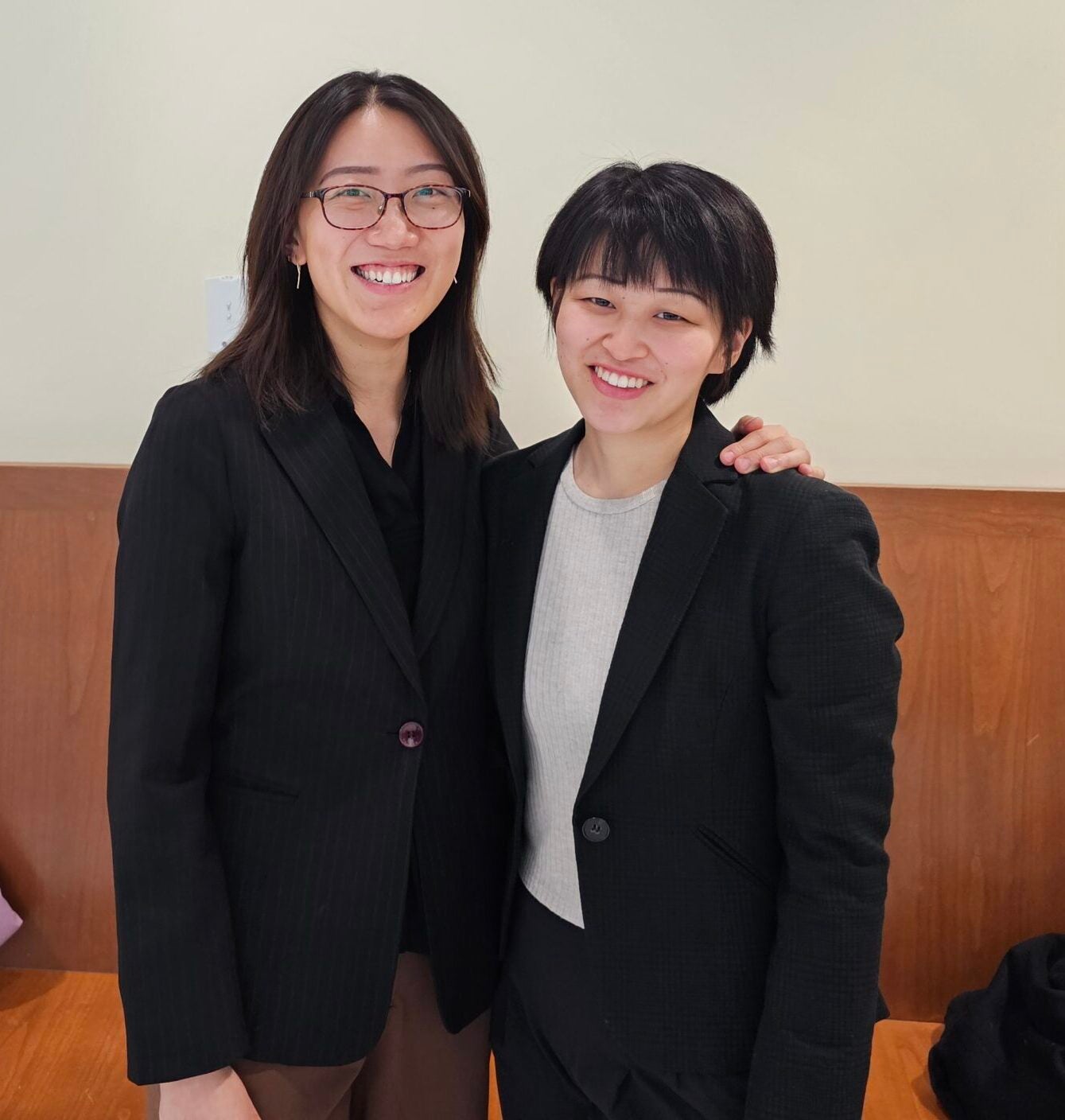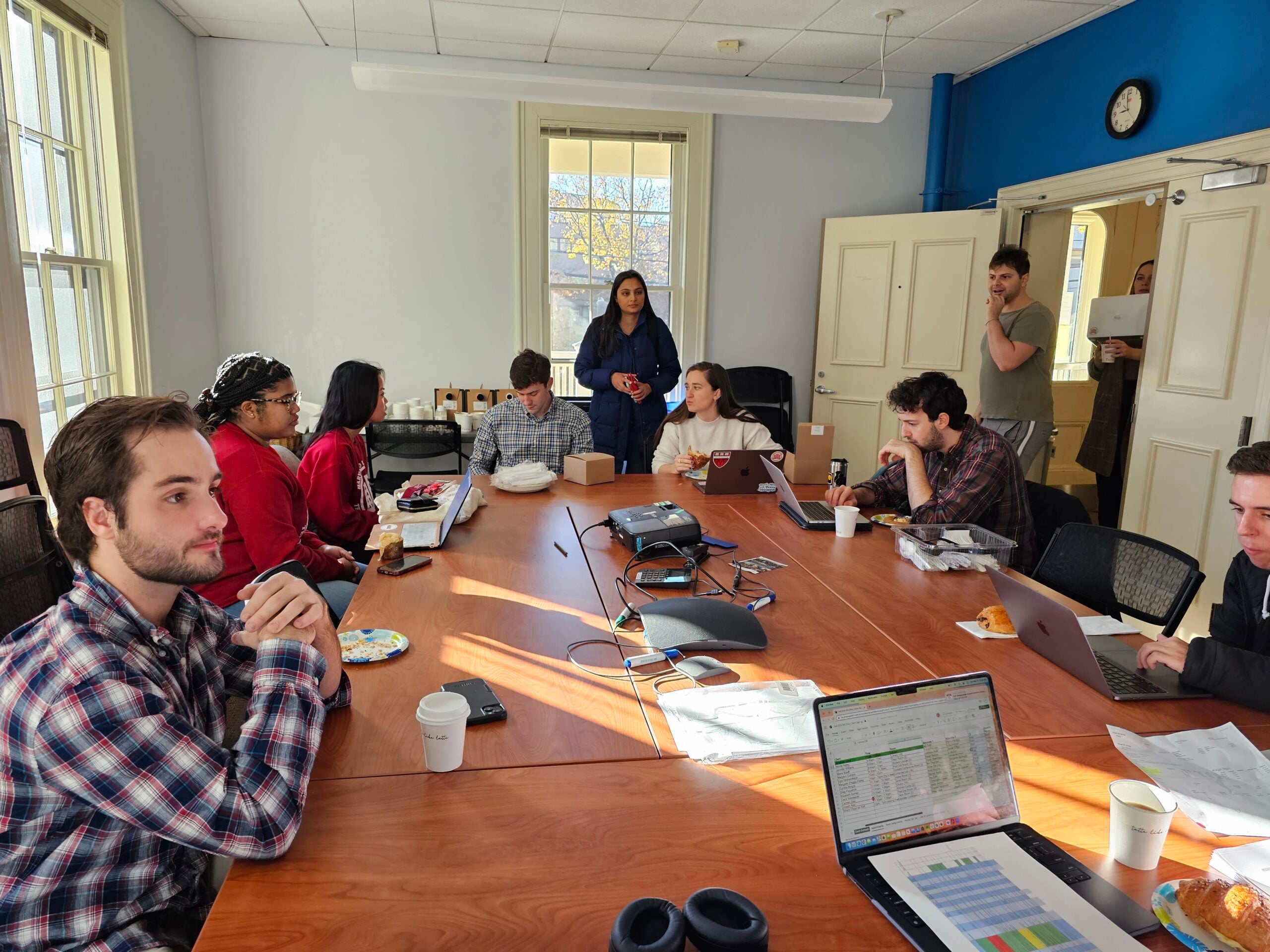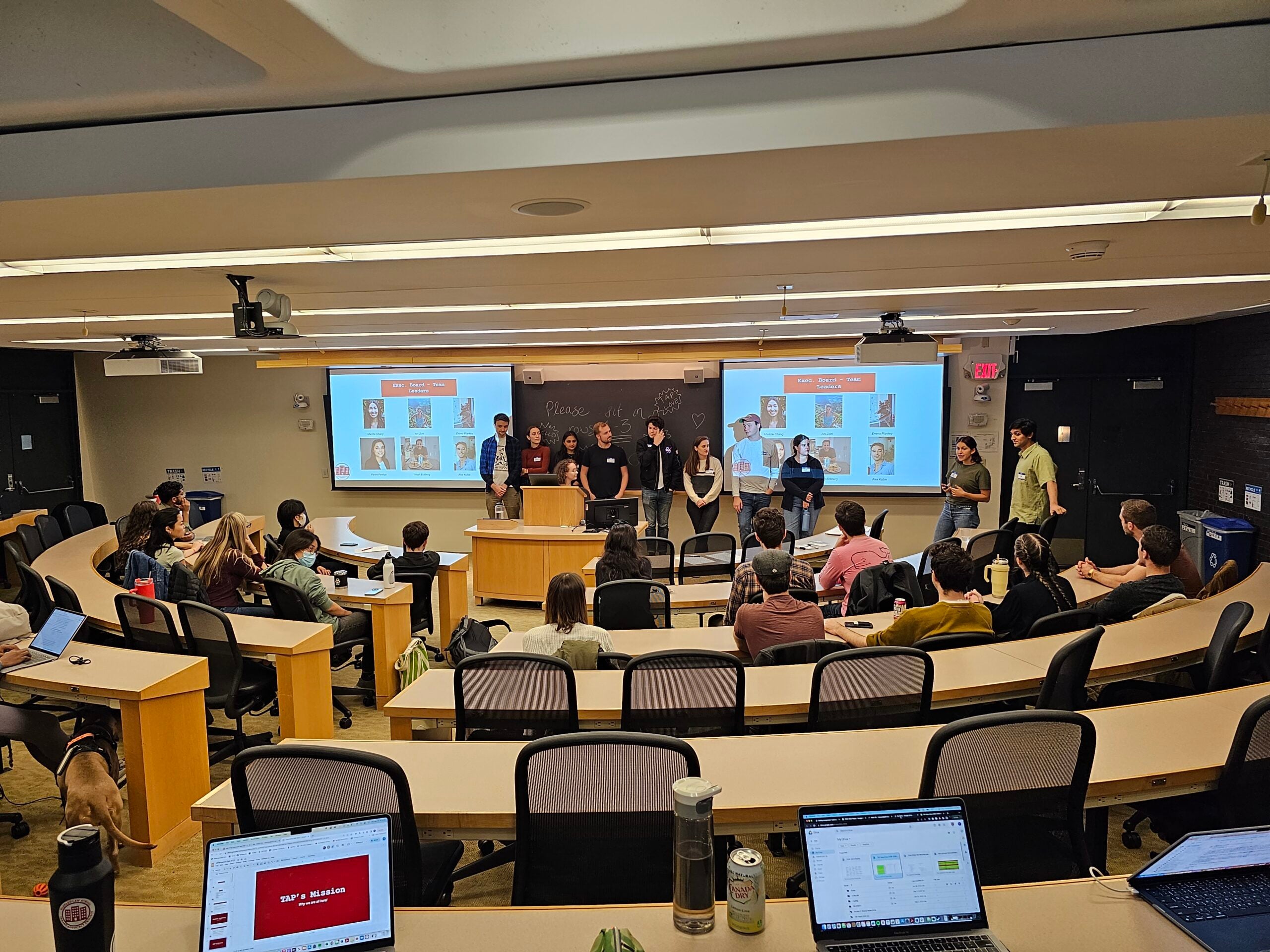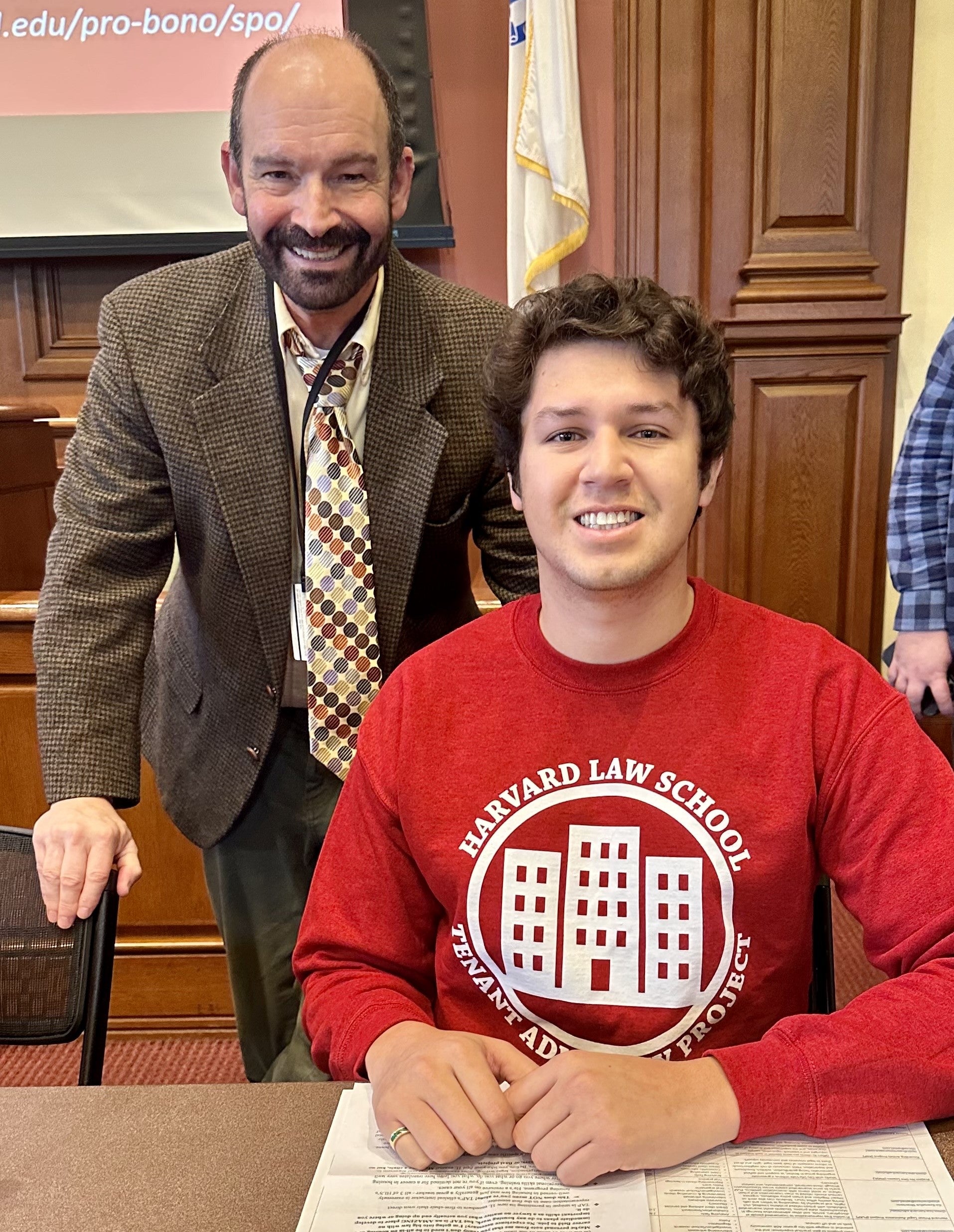Providing vital legal assistance to low-income tenants facing housing insecurity, the Tenant Advocacy Project (TAP) relies on the passion and commitment of Harvard Law School students. Led by Gary Allen, a clinical instructor with deep experience as a housing justice attorney, TAP offers a unique opportunity for students to dive into client-facing work, even appearing at hearings starting in their 1L year, and develop essential and transferable legal skills. In this interview, Allen shares his journey to TAP, the initiatives TAP has expanded during his tenure, and the remarkable work students undertake while navigating the complexities of housing law and advocating for their clients’ rights.

Office of Clinical and Pro Bono Programs (OCP): Could you please walk us through your legal career so far and how it led you to TAP?
Gary Allen: I have been in law practice for coming up on 14 years now. About six years after I started practicing law, another law school asked me if I could help supervise students during the summer. I loved it. After that experience, I became a clinical instructor at Harvard Law School in 2019, spending a summer supervising students in the Harvard Legal Aid Bureau. When I finished that summer, I started working at the Legal Services Center (LSC) in the Housing Law Clinic while a clinical instructor was on leave. During the pandemic I worked with another law school, and I came back to Harvard as the TAP clinical instructor in 2021.
OCP: When you arrived at TAP, what were your priorities? What initiatives have you begun or expanded within the organization?
Allen: When I got to TAP, we were just coming out of the COVID lockdown. Luckily, there were a lot of really committed students, and because it is a student-governed organization, the students drove the TAP vision and agenda. What I saw was jaw-droppingly inspirational. To have so many students in TAP, managing student governance and case management on top of their coursework and extracurricular activities, was amazing.
My priority is making sure the TAP students are engaged, they get great opportunities to do good work, and to develop skills they can take to whatever area of practice they want after they finish law school.

After my first year, I started thinking about what kinds of things TAP wanted to accomplish and what other ways to engage students and the community. We started an outreach program called the Reasonable Accommodation Clinic, where we invited members of the community to TAP on a Saturday so that we could help them write reasonable accommodation letters. Students really enjoyed that, and we’ve continued to do that several times each year.
In another novel achievement for TAP, we recently had our first small claims case go to court. That was a big deal, because typically law students don’t have a pathway into the courthouse until their second year. Two students worked on the case on a compressed schedule of about three weeks, and we prepared them for trial. Then we went to court, and we were able to get a settlement for the clients. It’s definitely something that students want to continue to do.
OCP: Since TAP is a student practice organization, students can have varying levels of involvement. Can you give an overview of the different kinds of work that most TAP students are involved in?
Allen: Most TAP students are participating in day-to-day operations. This could mean taking inbound phone calls, evaluating tenants’ concerns and figuring out if we are the right resource to help them or if we can help them access the resources they need. Every student is also expected to take on a case with a deeper level of commitment. A board of students, which 1Ls participate on alongside 2Ls and 3Ls, decides what cases we’re going to offer law firm-level representation on, and then we assign those out to the students. Almost all students in their first year are assigned both a case and do intakes.
Students in the upper years are more inclined to take leadership roles—they’re team leaders or sit on the intake review committee, which does a lot of deliberation about clients whose cases may get full representation from us. We also have a policy and outreach arm that works on policy issues and produces special events, like the Reasonable Accommodation Clinic. After students get past the basics and learn how to assess cases, they can choose what level and type of work that they want to do within the organization.

OCP: What sorts of legal skills are students getting to practice at TAP?
Allen: During TAP orientation every year, I give my “drinking from the firehose” speech. There is no way to practice law in a vacuum. If you’re going to work with clients with real problems, you have to tee up a number of skills really quickly. You have to learn how to talk to clients who may come from communities that are very different than yours. You have to start understanding what laws and other authorities apply—you sometimes have law, sometimes regulation, sometimes policy, sometimes contractual requirements. And that doesn’t even include things like business writing, legal writing, and professional conduct. All are integrated into the way we operate; you just cannot do one without the others. That’s a lot of learning for somebody that arrived at law school two or three weeks ago. But our students get through it, and 1Ls are regularly doing hearings, sometimes in their very first semester. It’s inspirational to see how the students are willing to dive in and swim as hard as they can to make sure that they take care of clients.
OCP: What do you want students to keep in mind as they build relationships with clients during their direct representation work?
Allen: Every case is a little bit different. We have to make sure that the students get a lot of good training up front to triage the cases, to identify what the biggest risk to somebody’s housing situation might be. There’s always a balance, because most of our clients have problems that go beyond just their housing issues. Some of our cases are connected to domestic violence, and there may be other monetary issues that come into play. Sometimes family members reside in their unit who are not on a lease, and that can lead to termination or other kinds of housing instability. But you’ve got to balance all of that with the fact that people value their family relationships, and we don’t want to tell people that family relationships aren’t important. So, it’s always a balancing act. We start with housing stability and work backwards from there.

OCP: How do you see TAP as a part of the greater Boston community? Can you talk about TAP’s collaborations with partner organizations, both at HLS and outside of it?
Allen: This is one of the most fun parts of the job, partnering with organizations for different purposes. A few years ago, we wrote a policy brief in conjunction with an outside partner advocating for how housing authorities should evaluate applications from people returning from the justice system and who need housing. Often, they’re denied vouchers because of past criminal history. We wrote a policy brief that was distributed to public housing authorities. We are urging housing authorities to implement important policy changes to make housing accessible to people who were involved with the justice system in the past.
We frequently work with both the HLS Legal Services Center (LSC) and with the Harvard Legal Aid Bureau (HLAB) on cases where one or the other partner has to hand off a case. Intakes will often come to LSC or HLAB that are appropriate for TAP, and they’ll suggest a referral to us; conversely, we do the same thing. We may do an administrative hearing, and if we are unsuccessful at overturning an adverse decision, we’ll pitch the case to LSC or HLAB, and sometimes they will take those cases to court when TAP’s remedies have run their course.
Sometimes there’s an overlap [with the clinics]. We had one case recently where our client was losing her voucher due to a debt to the landlord that accrued after our client lost her job. The court had made a mistake in final judgment, which impacted our client’s voucher eligibility. The judgment needed to get fixed but TAP doesn’t appear in court, so we partnered with LSC who went to court and asked the judge to amend the final order. The judge agreed, and TAP was able to persuade the voucher administrator to reinstate our client’s benefits. This result couldn’t have occurred without both programs being involved, and the end result was our client and her four children will continue to have stable housing.
OCP: What inspires you about working with law students, especially those interested in housing justice?

Allen: First, the level of commitment and passion that students bring to the organization really gets me out of bed every day. When you do the same job for 10 or 20 years, I think everybody can flatten out at some point. But TAP inspires me in different ways every single semester, and it never gets old. Because it’s student driven, the priorities change every couple of years. Every semester is different, which is a cool way to come to work. It’s never routine here. And that’s the best kind of job ever.
OCP: What would you say to students who might be interested in joining TAP? How can students get involved?
Allen: TAP is a unique program that affords students the opportunity to connect with clients, appear at hearings and make a life changing difference for people who might otherwise fall through the cracks in the system. And students get to do all of that before they write their first paper or take their first final exam.
TAP is defined by its sense of community, and many of our students participate for all three years of law school.
We accept students in the fall. You can find us at the Student Organizations Fair in September, tabling and taking applications.
Filed in: Clinical Voices
Tags: Tenant Advocacy Project
Contact Office of Clinical and Pro Bono Programs
Website:
hls.harvard.edu/clinics
Email:
clinical@law.harvard.edu